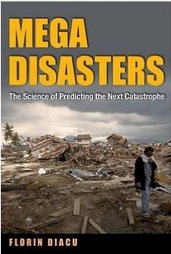This is a test.
Archive for October, 2015
This is a test
Saturday, October 31st, 2015This is a test
Friday, October 30th, 2015This is a test.
This is a test
Thursday, October 29th, 2015This is a test.
This is a test
Wednesday, October 28th, 2015This is a test.
This is a test
Tuesday, October 27th, 2015This is a test.
This is a test
Monday, October 26th, 2015This is a test.
Mega Disasters: The Science of Predicting the Next Catastrophe
Sunday, October 25th, 2015Florin Diacu possesses a rare talent. He holds a PhD in Mathematics from the University of Heidelberg in Germany and is a professor of mathematics and former director of the Pacific Institute for the Mathematical Sciences at the University of Victoria in Canada. And he has written a book that tells the story of how scientists and mathematicians have worked to advance the frontiers of disaster prediction that is completely engaging and informative to the lay-person. Read Mega-Disasters, published by Princeton University Press, and you will be a more discerning viewer of the Weather Channel or CNN the next time a major storm breaks. The book is organized into nine chapters:
- Walls of Water: Tsunamis
- Land in Upheaval: Earthquakes
- Chimneys of Hell: Volcanic Eruptions
- Giant Whirlwinds: Hurricanes, Cyclones and Typhoons
- Mutant Seasons: Rapid Climate Change
- Earth in Collision: Cosmic Impacts
- Economic Breakdown: Financial Crashes
- Tiny Killers: Pandemics
- Models and Predictions: How Far Can We Go?
I loved this book on so many levels. First, Professor Diacu conveys a tone of compassion for disaster victims, even as he explains the science of anticipating the frequency and severity of storms. He dedicated his book “to all those who try to make the world a safer place.” Second, and this comes from the insurance geek in me, he explains how a language convention for actuarial shorthand, describing 1-in-100 year events, is misinterpreted by those who don’t understand that a probability event does not address how events are clustered. When a severe earthquake strikes, it does not mean that we are safe for the next 99 years. Finally, he takes a comprehensive view of risk, addressing threats of pandemic illnesses and economic collapses. I also appreciate his engaging writing style. As the sustainability of our societies becomes increasingly dependent of our ability to cope with severe disasters, this book is relevant to everyone. I highly recommend it.
This is a test
Saturday, October 24th, 2015This is a test.
This is a test
Friday, October 23rd, 2015This is a test.
This is a test
Thursday, October 22nd, 2015This is a test.
